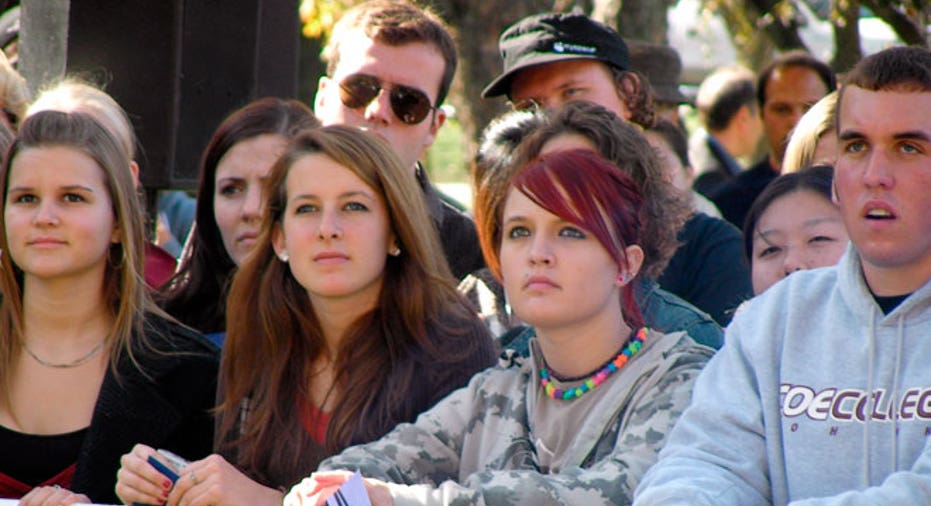Youth Vote Magic: How the Economy Impacts 2012

Campaign buttons hung from fall jackets. Shiny new bumper stickers stuck to nearly every other car in the parking lot. And signs proclaiming an era of “hope and change” adorned many dorm room windows. In 2008, it was nearly impossible to walk across a college campus in America without seeing the latest remnants of a campaign stop or “Rock the Vote” rally.
But four years later, the enthusiasm from young voters that helped propel Barack Obama to the presidency doesn’t seem as omnipresent. And a big reason is the economy.
According to a Generation Opportunity poll of voters ages 18-29, 89% of respondents said the current state of the U.S. economy is impacting their daily lives. Nearly half have had to reduce their budgets for groceries, while others have taken on additional jobs, sold personal items, and moved in with family or friends to save cash.
So, what impact could those tough economic conditions -- and a nearly 13% unemployment rate among young adults -- have on the president’s re-election efforts? Bobbi Gentry, chair of the political science department at Millikin University, said for young voters, it’s all about money.
“Young people vote with their pocketbooks,” she said. “And they need to know candidates care about their interests. This year, it’s economic interests.”
When it comes down to it, the issues young voters care about are the same as the rest of the nation. But they see it through a different lens. Rather than necessarily worrying about the big picture, like whether America will be able to avoid the fiscal cliff, they consider whether they can afford to buy groceries this week, or pay to fill up their gas tanks. And they might not delve too deeply into U.S. jobs data, but instead worry about whether they will be able to find their own professional career after graduation.
The Generation Opportunity poll shows 64% of young voters said the availability of quality, full-time jobs after graduation is more important than lower student loan interest rates – a main focus of the Obama campaign’s efforts to reach the 18-29 year old voting bloc. Those young voters are concerned not only about being unemployed, but also about the resentment that comes from being underemployed – working lower level jobs that don’t allow them to utilize their degrees and skill sets.
Gentry said young people are, however, increasingly worried about whether they’ll be saddled with student loan debt well into adulthood.
“I’m seeing students concerned with student loans and I would argue that’s the next big bubble,” she said. “That’s a challenge for students coming through now because of the increased cost of college.”
Strapped with more debt and a longer period of time separating graduation from full-time employment, young voters are doing more than just worrying about where their next paycheck will come from – they’re putting off major life choices as well.
To put it in perspective, of the 84% of young voters delaying major life choices: -38% aren’t buying their first home -32% choose not to go back to school -31% are delaying starting a family -27% are changing jobs or moving to new cities -26% are stalling paying off student loans or other debt
Gentry said delaying big life expenditures like buying a home or getting married prevents the necessary transitions into adulthood. She says those delays are cause for concern not just for the futures of young voters, but also the American economy.
“Young people can impact the future with purchasing a home, just having a basic investment. Without it, they’re much more likely to live in their parents’ homes,” she said. “It’s an aspect of personal independence that’s going to be an issue with young people today. Same with getting married. Young people today stay single or live together longer and put off marriage.”
That’s the same sentiment Americans heard from Federal Reserve Chairman Ben Bernanke who cautioned in a March speech that "people unemployed for a long time have historically found jobs less easily than those experiencing shorter spells of unemployment, perhaps because their skills erode, they lose relationships within the workforce, or they acquire a stigma that deters firms from hiring them." He added the "loss of skills and lower rates of employment reduce the economy’s overall productive capacity over the longer term."
So what does all this mean with less than two months before Election Day? It equates to a mounting challenge of capturing the youth vote.
But, Gentry said even despite President Obama’s increasing challenge to find the same kind of inspirational language he used in 2008, he isn’t facing the battle for young voters alone. Gentry said the youth vote is never locked in for one side of the political spectrum or the other, despite the common assumption youth voters lean heavily left. And with the economy, jobs, and personal economics in full focus, both sides have their work cut out for them.
“Youth voters are up for grabs, but there has to be clear articulation by both campaigns about what young people’s interests and how they’re going to address them, especially economic interests,” Gentry said.
“Communicating macroeconomics the way young people understand will be important and the candidate who does that better has the better campaign strategy. It’s about making economics accessible and understandable.”
Aside from deciding which candidate’s economic policy ideas are better, it all boils down to whether Obama and Mitt Romney can convince 18-25 year olds to show up at the polls come November.



















